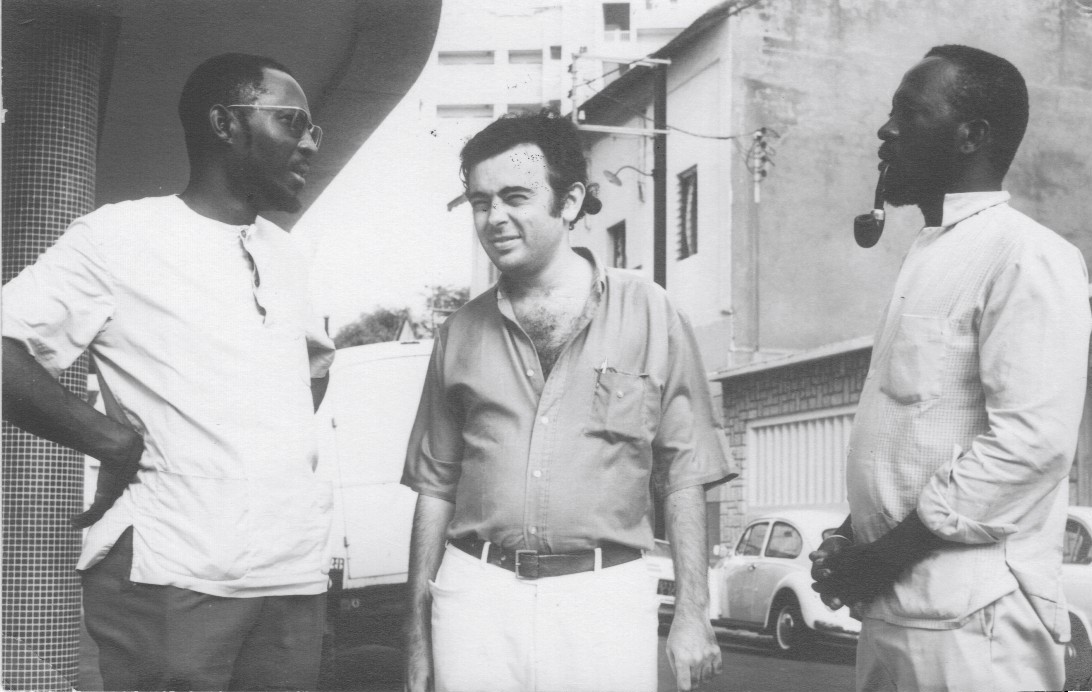Following the recent acquisition of the Ousmane Sembène archives by the Lilly Library, the papers of Paulin S. Vieyra by the Black Film Center & Archive and his films by the Moving Image Archive, Dr. Vincent Bouchard has formed the Early African Cinemas Lab at IU. Bringing together interested undergraduate and graduate students, specialists of African Film, and campus-based centers and resources, the EACL facilitates research into this rich and valuable collection of primary sources to provide a more accurate view of Francophone cinemas and to better understand the preliminary stage of cinematic activities and institutions in Senegal in the 1960s.
About
African film studies are currently undergoing a revival, as scholars move away from a prior focus on feature films by male filmmakers distributed through the film festival circuit (FESPACO model, Bouchard 2019). As demonstrated by the recent work of Akin Adesokan (IU), Moradewun Adejunmobi (UC Davis), Ntone Edjabe (Cape Town U.), Ute Fendler (Bayreuth U.), Rachel Gabara (U. of Georgia), Amadou Ouédraogo (U.L. Lafayette), and Alexie Tcheuyap (U. of Toronto), there is growing interest in a more diverse film production formats (television, documentary, etc.) and in a wider breadth of scholarly perspectives, like gender and queer studies. To properly contextualize these new approaches, it is essential to develop an image of early African cinemas outside of the FESPACO model that is grounded in concrete, factual analyses of means of production, funding sources, and conditions of reception.
We are leading a series of interconnected projects which are all related to archival sources on Early African Cinemas: the papers of both Ousmane Sembène and Paulin S. Vieyra. Sembène (1923-2007), a writer and filmmaker, directed the short films Borom Sarret in 1962 and La Noire de... in 1966, both globally recognized as classics, as evidenced by their recent restoration and release in the Criterion Collection. Known for his dramatization of both colonial and postcolonial injustices, Sembène is to this day regarded as the “father” of African cinema, but Vieyra (1925-1987), his friend, mentor, and producer, worked behind the scenes to contribute to the field. Vieyra was an unavoidable figure in Early African Cinemas, dedicating his life to its promotion through his production of films for the Senegalese government, his mentorship of young filmmakers, and his role as the first sub-Saharan African film historian. Both filmmakers are central in their aesthetic innovation in a postcolonial environment and in the development of the means of audiovisual production during this period of change, both in Senegal and French-speaking West Africa more largely. As intellectuals and artists, but also as political activists, they participated in making movies with a mode of representation closer to the African public more available. Importantly, they both kept the papers and materials related to their storied careers in their archives, now at the IU Bloomington campus.
The two overall goals of this Lab are (1) to expose new understandings on Early African Film and postcolonial cultures stemming from newly acquired archives to specialists and the interested public and (2) to promote document-based research methodologies, by stressing their accuracy and pertinence in academic publications and by training the next generation of humanities researchers. The Early African Cinemas Lab will assist in structuring this emergent research field by bringing together students, young scholars, and African Film specialists internal and external to IU while advancing a wave of research projects in a collaborative fashion.

 The College of Arts
The College of Arts